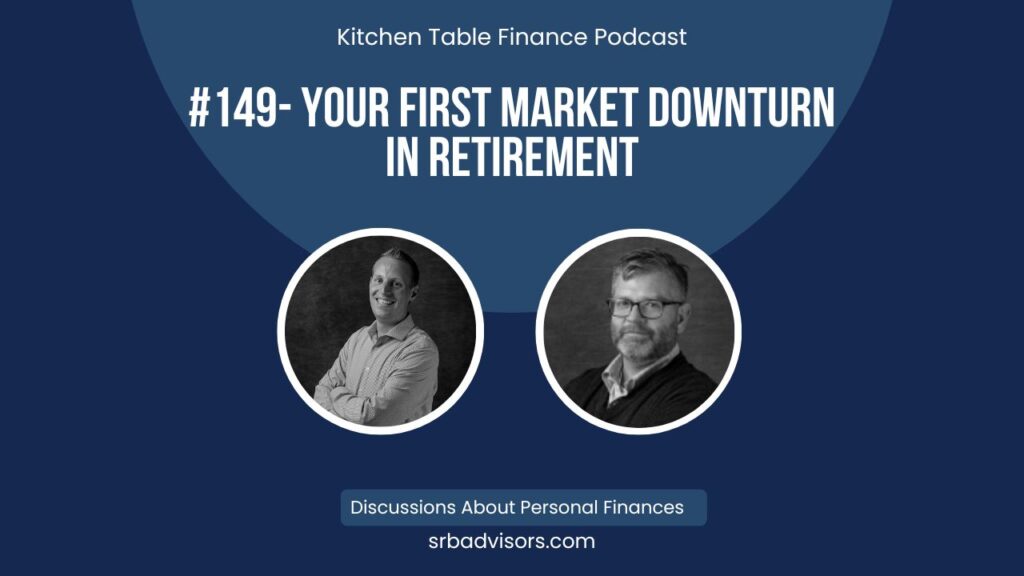Ep 149 – Your First Market Downturn in Retirement

Podcast: Play in new window | Download
Congratulations! You made it to retirement. You’ve worked hard, planned hard, saved, and are now enjoying your time. And then, the market dives. What do you do?
Watch on YouTube HERE
How do you deal with your first market downturn in retirement?
Common advice is to invest for the long term and stay put in the short term. The markets are volatile in the long term and the averages typically work out. Well, how does that work when you’re in that transition mode?
When you’re in your 20s and 30s it’s easy to follow this rule because you have a lot of time. However, that starts to change as you transition into retirement. Our perception changes. Indeed, you don’t have more time today than you had yesterday, but how we think about it is probably more important.
There’s a flip that seems to switch once you turn on retirement and stop putting more money in. Now you’re taking it out. All of a sudden, this mythical pot of money you’ve been building and growing for the last 30 years has to turn into enough for you to survive on for the next 30 years of retirement. It’s a big psychological shift for sure.
Join Dave and Nick as they walk you through this transition and shift in thinking.
Stock Market Downturns are a Fact of Life
There’s no way around that. There have been between 80 and 90 corrections since World War II. Over the last 80+ years, there has been on average one major stock market correction every year. We define a correction as a drop of 10% or more from the high.
We’re talking a range of between a positive 38% and a minus 39% since 1980, yet the historical average since 1980 is 9%. So, if you stay invested in the S&P 500, your average since 1980 has been nine percent. But in any given year, it’s likely to see a movement in that range of at least a 10% downside.
That’s a hard thing to wrap your mind around as an investor. If you are told your average returns are going to be 9%, you assume that you’re gonna be somewhere in the ballpark every year. In reality, you’re never going to get a 9% rate of return. Psychologically, that’s hard. Furthermore, as you’re getting closer to retirement, some of the things that made you feel better about it when you were 30 no longer apply.
If you’re working with a financial planner, they’re not going to set you up in a situation where if those things happen, all of a sudden, your plan’s no good. However, the first time it happens as a new retiree it is still difficult.
Tons of research from psychology shows the more that we’re exposed to a concept, the less scary it becomes. So definitely trust and test your plan. Make sure that your asset allocation is appropriate for your new circumstances. That changes over time. What’s right for a 65-year-old heading into retirement is not the same portfolio that was right when they were 30.
Many People Heading into Retirement are Drawn to Products That Offer Guarantees
Those can have their place too, just recognize that there’s no silver bullet out there. Some salespeople know exactly what your emotions will be and they will turn it into something that benefits them. It’s something that you have to be careful of. Just know that they have a cost and try to quantify that cost before you’re paying something you didn’t want to pay.
How do you build a mindset around a market correction?
How do you strengthen your mental acuity in a situation like this? You can follow some techniques from cognitive behavioral therapy, but the first step is acceptance. The markets are going to be volatile and there are going to be times when you’re going to feel emotionally distressed because of your portfolio. If you’re going to be invested, that’s part of the price you pay.
Step two is to educate yourself. Have a plan and remind yourself that market corrections are part of the plan. You have to know, in general, how much risk you’re taking and remind yourself that corrections are part of that plan too.
Step three is to habituate yourself by thinking about when times are good and reminding yourself that it is common. Don’t forget that this will happen again.
Gather around and follow the Kitchen Table Finance podcast to learn about money and simple ways you can invest right now.
You can find more practical advice at srbadvisors.com and contact the team for personal planning by emailing info@srbadvisors .com.
About Shotwell Rutter Baer
Shotwell Rutter Baer is proud to be an independent, fee-only registered investment advisory firm. This means that we are only compensated by our clients for our knowledge and guidance — not from commissions by selling financial products. Our only motivation is to help you achieve financial freedom and peace of mind. By structuring our business this way we believe that many of the conflicts of interest that plague the financial services industry are eliminated. We work for our clients, period.
Click here to learn about the Strategic Reliable Blueprint, our financial plan process for your future.
Call us at 517-321-4832 for financial and retirement investing advice.
Share post:
